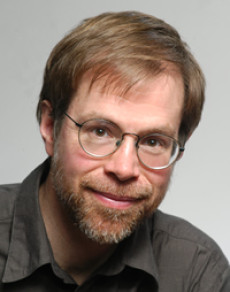James Demmel Receives 2010 Fernbach Award
Demmel is the fourth Berkeley Lab scientist to receive a Fernbach Award
September 30, 2010
Contact: Jon Bashor, jbashor@lbl.gov, 510-486-5849
LOS ALAMITOS, Calif.,— James W. Demmel has been named the recipient of the 2010 IEEE Computer Society Sidney Fernbach Award for his contributions to high-performance linear algebra software.
Demmel is a professor of mathematics and computer science at the University of California, Berkeley, where he holds the Dr. Richard Carl Dehmel Distinguished Professorship of Engineering. He is the founding chair of the graduate group in Computational Science and Engineering at UC Berkeley, which includes 117 participating faculty from 22 departments. Demmel also has a joint appointment as a member of the Future Technologies Group at Lawrence Berkeley National Laboratory.
He received the award "for computational science leadership in creating adaptive, innovative, high-performance linear algebra software." The award to Demmel brings to four the number of Fernbach Award recipients at Lawrence Berkeley National Laboratory. In addition to Demmel, other Berkeley Lab awardees are David Bailey (1993), Phillip Colella (1998), and John Bell (2005).
Involved in the design and development of algorithms and mathematical software for the past two decades, Demmel is known for his work on LAPACK and ScaLAPACK, which form the standard mathematical libraries for AMD, Apple (under Mac OS X), Cray, Fujitsu, Hitachi, HP, IBM, IMSL/Rogue Wave, Intel, InteractiveSupercomputing, several Linux distributions (including Debian), Mathworks (MATLAB), NAG, NEC, PGI, and SGI.
The software and standards Demmel developed enable users to transition their computer programs to new high-performance computers without having to re-implement the basic building blocks. The software is used by hundreds of sites worldwide, including all U.S. Department of Energy national laboratories, NASA research laboratories, many universities, and companies in the aerospace, automotive, chemical, computer, environmental, medical, oil, and pharmaceutical industries.
His parallel direct sparse linear equation solver SuperLU (with Xiaoye Sherry Li) was used to solve a quantum mechanical three-body scattering problem, leading to a 1999 cover article in Science magazine. His parallel unstructured 3D multigrid solver for finite element problems Prometheus (with Mark Adams) won the Carl Benz Award for the best industrial application at the Mannheim Supercomputer '99 Conference. His parallel eigensolver in ScaLAPACK (with Jack Dongarra and Ken Stanley) was runner-up in the Gordon Bell Peak Performance Prize at SC98.
Demmel is a fellow of IEEE, ACM, and SIAM, and a member of the National Academy of Engineering. He was the recipient of the J. H. Wilkinson Prize in Numerical Analysis and Scientific Computing in 1993, the SIAM SIAG on Linear Algebra Prize in 1988 and 1991, a Presidential Young Investigator Award in 1986, and an IBM Faculty Development Award in 1985, among others.
He received his B.S. in mathematics from Caltech in 1975 and his Ph.D. in computer science from UC Berkeley in 1983. After spending six years on the faculty of New York University's Courant Institute, Demmel joined the computer science and mathematics department at UC Berkeley in 1990.
Established in 1992 in memory of high-performance computing pioneer Sidney Fernbach, the award recognizes outstanding contributions in the application of high-performance computers using innovative approaches. Set to be presented on 17 November at SC10 [http://sc10.supercomputing.org/], the award consists of a certificate and a $2,000 honorarium.
Roberto Car and Michele Parrinello, developers of the Car Parrinello Molecular Dynamics (CPMD) approach, were the 2009 co-recipients of the Fernbach award. Previous Sidney Fernbach Award recipients include Marsha Berger, Jack J. Dongarra, William Gropp, David Keyes, and Edward Seidel.
About the Computer Society
With nearly 85,000 members, the IEEE Computer Society is the world's leading organization of computing professionals. Founded in 1946, and the largest of the 38 societies of the Institute of Electrical and Electronics Engineers (IEEE), the Computer Society is dedicated to advancing the theory and application of computer and information-processing technology, and is known globally for its computing standards activities.
The Computer Society serves the information and career-development needs of today's computing researchers and practitioners with technical journals, magazines, conferences, books, conference publications, and online courses. Its Certified Software Development Professional (CSDP) program for mid-career professionals and Certified Software Development Associate (CSDA) credential for recent college graduates confirm the skill and knowledge of those working in the field. The CS Digital Library (CSDL) is an excellent research tool, containing more than 250,000 articles from 1,600 conference proceedings and 26 CS periodicals going back to 1988.
About Computing Sciences at Berkeley Lab
High performance computing plays a critical role in scientific discovery. Researchers increasingly rely on advances in computer science, mathematics, computational science, data science, and large-scale computing and networking to increase our understanding of ourselves, our planet, and our universe. Berkeley Lab’s Computing Sciences Area researches, develops, and deploys new foundations, tools, and technologies to meet these needs and to advance research across a broad range of scientific disciplines.







 Instagram
Instagram YouTube
YouTube